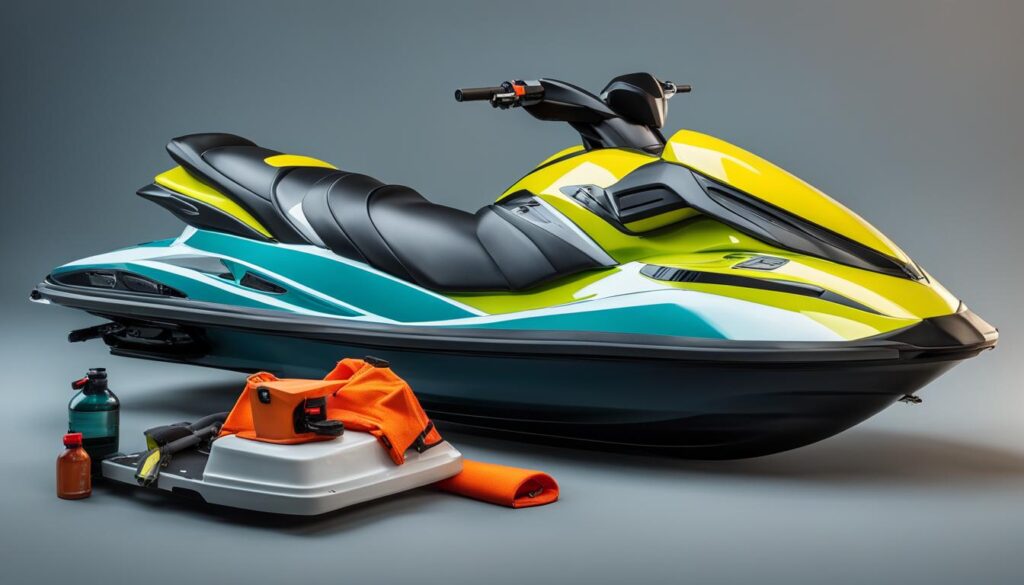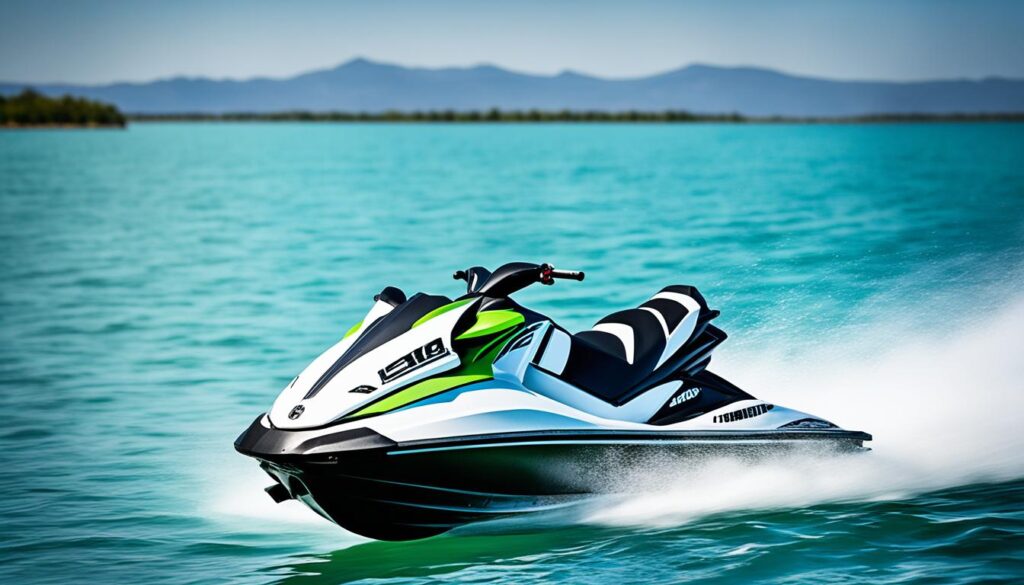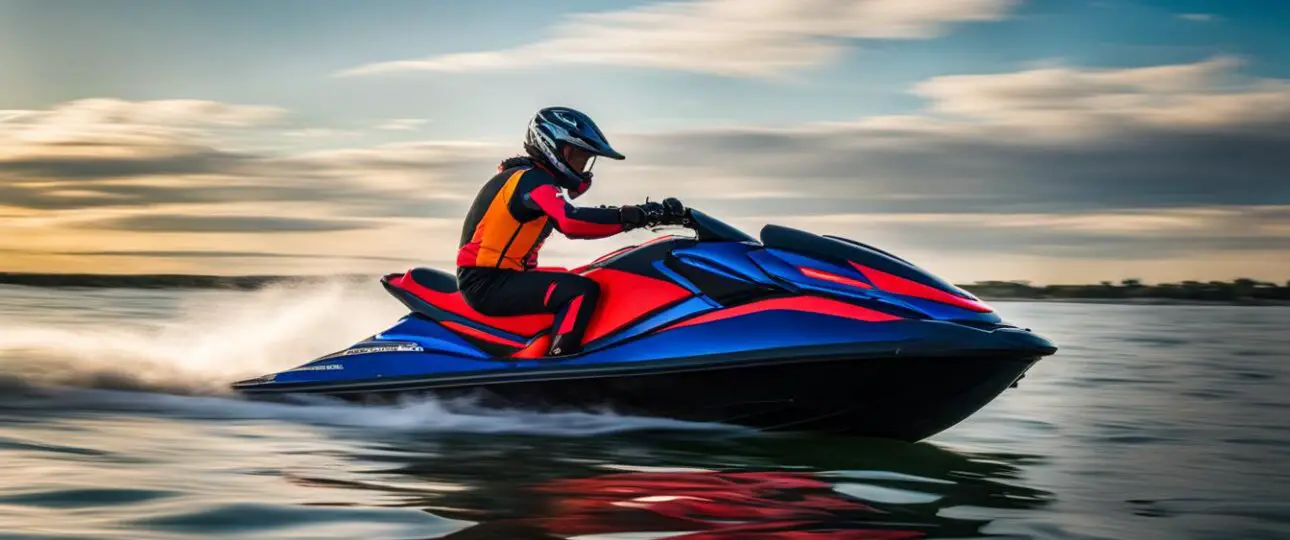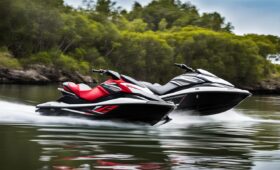When it comes to jet skis, weight is an essential factor to consider. Understanding the weight of a jet ski can help you determine if your vehicle can tow it and ensure you comply with weight limits set by manufacturers. In this guide, we’ll explore the average weight of jet skis, from the lightest models to the heaviest ones, as well as their weight capacity.
Key Takeaways:
- The average weight of a jet ski ranges from 270 to 950 pounds.
- The weight does not include fuel, oil, and gear.
- The lightest jet skis weigh around 270 to 363 pounds, while the heaviest models can weigh up to 940 pounds.
- Jet ski weight capacity varies depending on the make and model.
- Considering the weight of a jet ski trailer is crucial for safe and efficient transportation.
How Much Does a Jet Ski Weigh?
When it comes to the weight of jet skis, there can be a significant variation depending on the make and model. On average, a jet ski weighs between 270 to 950 pounds. However, it’s important to note that this weight represents the net weight of the jet ski alone, without accounting for additional factors such as fuel, oil, and gear.
The weight of a jet ski can be influenced by several factors, including its size, engine power, and hull design. Larger jet skis tend to be heavier, as they require a more robust structure to accommodate their size. Additionally, higher-powered engines can contribute to increased weight.
It’s essential to consult the manufacturer’s specifications for an accurate understanding of the weight of a specific jet ski model. The manufacturer’s information will provide detailed insights into the weight of the jet ski, including any variations based on optional features or add-ons.
To give you a better idea of the weight range of jet skis from different manufacturers, here’s a table highlighting some examples:
| Brand | Model | Weight Range (in pounds) |
|---|---|---|
| Sea-Doo | Spark series | 420-500 |
| Yamaha | EX series, JetBlaster | 550-600 |
| Kawasaki | SX-R 160 (stand-up) | 503 |
Please note that the table above provides only a few examples of jet ski models and their weight ranges. The actual weight of a jet ski may vary depending on the specific model and any additional features or modifications.
Understanding the weight of a jet ski can be crucial for various reasons, such as determining if your vehicle is capable of safely towing it or complying with weight limits set by manufacturers. By considering the weight of a jet ski, you can make informed decisions and ensure a safe and enjoyable experience on the water.
Why Does Jet Ski Weight Matter?
Jet ski weight plays a significant role in various aspects of owning and operating a personal watercraft. Here are a few reasons why understanding the weight of a jet ski is important:
- Towing: If you plan to transport your jet ski on a trailer, knowing its weight is essential for selecting an appropriate vehicle with the towing capacity to handle the load.
- Storage: The weight of a jet ski should be taken into consideration when determining the storage options, whether you’re storing it on land or using a floating dock.
- Performance: The weight of a jet ski can affect its performance. Lighter jet skis may offer increased agility and quicker acceleration, while heavier models may provide stability and better handling in rough waters.
- Weight Capacity: Each jet ski is designed to accommodate a specific weight capacity. Knowing the weight of the jet ski is crucial for ensuring you don’t exceed this limit, as it can affect the performance and safety of the watercraft.
By understanding the weight of a jet ski and its implications, you can make informed choices and maximize your enjoyment while riding on the water.
Sea-Doo, Waverunner, and Jet Ski Weight Chart
Different manufacturers offer jet ski models with varying weights. Sea-Doo, Yamaha, and Kawasaki are three major brands in the PWC industry. The weight of their models ranges as follows:
| Brand | Model | Weight (pounds) |
|---|---|---|
| Krash | Stand-up models | 273-363 |
| Yamaha SUPERJET (stand-up) | 375 | |
| Sea-Doo | Spark series | 420-500 |
| GTI series, GTX 170, Wake 170 | 740-780 | |
| Yamaha | EX series, JetBlaster | 550-600 |
| VX series, GP | 680-780 | |
| Sea-Doo | RXT, RXP, GTX, GTR series | 780-900 |
| Fish Pro, Wake Pro 230 | 780-940 | |
| Yamaha | FX series | 830-900 |
| Kawasaki | Ultra 310 series | 890-950 |
Please note that these weights are approximate and can vary based on specific models and features.
Factors Affecting a Jet Ski’s Weight
Several factors can influence the weight of a jet ski. These include:
- Hull material: The material used in the hull construction can impact weight. Materials like Polytec, NanoExcel, and fiber-reinforced plastic (FRP) are commonly used for lighter weight hulls.
- Engine stroke: Two-stroke engines generally weigh less than four-stroke engines, affecting the overall weight of the jet ski.
- Performance: Higher-performance jet skis often have larger engines and more durable hulls, resulting in increased weight.
- Features and additions: Additional features such as comfort seats, wakeboard racks, coolers, or fishing accessories can add extra weight to the jet ski.
- Fuel capacity: The size of the fuel tank affects the weight of the jet ski, as a full tank of fuel can add significant weight.
- Gear: The weight of safety accessories and other gear carried on the jet ski should also be considered in the total weight.
These factors collectively contribute to the overall weight of a jet ski, highlighting the importance of understanding how various elements impact the final weight.

What Does Curb Weight of a Jet Ski Mean?
When it comes to understanding the weight of a jet ski, there are two important terms to be familiar with: dry weight and curb weight. Each term refers to different aspects of a jet ski’s weight and can impact your decision-making process. Let’s take a closer look at what these terms mean and why they matter.
Dry Weight:
The dry weight of a jet ski refers to its weight without any added elements such as gas, oil, or gear. Essentially, it represents the bare minimum weight of the watercraft itself, providing a baseline measurement. By considering the dry weight, you can gain insights into the structural weight of the jet ski and its inherent characteristics.
Curb Weight:
In contrast, the curb weight of a jet ski includes the weight of the watercraft with all fluids, including gas and oil, as well as any attached accessories. This measurement provides a more comprehensive understanding of the jet ski’s weight when it’s fully equipped and ready for use in the water. Comparing curb weights allows for a more accurate assessment when evaluating different jet ski models.
Understanding the difference between dry weight and curb weight is crucial when researching and comparing jet skis. While dry weight provides a baseline measurement of a jet ski’s inherent weight, curb weight offers a more realistic representation of its true weight when all necessary elements are taken into account.
It’s worth noting that the curb weight can vary depending on the specific model and any additional features or attachments. Manufacturers typically provide curb weight information in their specifications, allowing potential buyers to make informed decisions based on their specific needs and preferences.
To further illustrate the importance of curb weight, here’s an image of a jet ski in action:

How Much Do a Single and Double Jet Ski Trailer Weigh?
When it comes to transporting a jet ski, having a reliable trailer is essential. But have you ever wondered how much a jet ski trailer weighs? Let’s explore the weight of single and double jet ski trailers, so you can make informed decisions when it comes to towing your personal watercraft.
Single Jet Ski Trailer Weight
A single jet ski trailer typically weighs between 170 to 300 pounds. This weight can vary depending on factors such as the trailer’s construction material, size, and additional features. It’s important to note that the weight of the trailer does not include the weight of the jet ski itself or any additional gear and equipment.
Additionally, single jet ski trailers generally have a load capacity of 1,800 pounds. This means that the trailer can safely carry a jet ski weighing up to 1,800 pounds, including the weight of the trailer itself.
Double Jet Ski Trailer Weight
If you own multiple jet skis or plan on towing two jet skis simultaneously, a double jet ski trailer may be the right choice for you. The weight of a double jet ski trailer can range from 500 to 1,500 pounds. The weight will depend on factors such as the trailer’s size, capacity, and construction material.
Similar to single jet ski trailers, the weight mentioned does not include the weight of the jet skis or any additional gear. It’s important to consider the combined weight of the jet skis and the trailer when determining if your vehicle is capable of safely towing the load.
Choosing the Right Trailer
When selecting a jet ski trailer, it’s crucial to consider not only the weight but also other factors such as trailer size, construction quality, and added features. Make sure to check the manufacturer’s specifications and recommendations for your particular jet ski model.
In addition, it’s important to choose a trailer that offers proper support and security for your jet ski during transport. Look for features like a sturdy frame, reliable suspension system, and secure tie-down points to ensure a safe and smooth towing experience.
Comparison of Single and Double Jet Ski Trailer Weights
| Trailer Type | Weight Range | Load Capacity |
|---|---|---|
| Single Jet Ski Trailer | 170 to 300 pounds | Up to 1,800 pounds |
| Double Jet Ski Trailer | 500 to 1,500 pounds | Depends on the trailer’s capacity |
Table: A comparison of the weights and load capacities of single and double jet ski trailers.
Keep in mind that the weights mentioned in this table are approximate and can vary depending on the specific make and model of the trailer. Be sure to consult the manufacturer’s specifications for precise weight details.
By understanding the weight of jet ski trailers, you can ensure that your towing setup is safe and compatible with your vehicle’s towing capacity. Investing in a high-quality trailer that suits your needs will help you transport your jet skis with ease and convenience.
How Much Do a Waverunner and a Trailer Weigh?
The weight of a Waverunner, a popular brand of personal watercraft, can vary depending on the specific model and configuration. On average, a Waverunner weighs between 336 to 964 pounds, depending on factors such as the size and features of the model. When considering the weight of a Waverunner, it’s important to note that this weight does not include additional items such as fuel, oil, and gear.
When combined with a trailer, the total weight will depend on the weight of the Waverunner and the trailer itself. A single Waverunner trailer typically weighs between 300 to 600 pounds, providing a sturdy and reliable means of transporting your watercraft. For those with multiple Waverunners to transport, a double Waverunner trailer can range from 500 to 1,000 pounds in weight, accommodating multiple vehicles.
It’s essential to consider the weight of both the Waverunner and the trailer when planning for transportation. Ensure that your vehicle is capable of towing the combined weight safely and that you adhere to all recommended weight limits and towing capacities.
Conclusion
Understanding the weight of a jet ski is essential for a seamless and enjoyable experience on the water. Whether you’re planning to tow your jet ski, store it, or ensure compliance with weight limits, having a grasp of its weight is crucial. Jet ski weights can range from 270 to 950 pounds, depending on the make and model.
However, it’s important to remember that the weight mentioned above is the net weight and doesn’t include the weight of fuel, oil, and gear. To get an accurate estimate of the total weight, make sure to factor in these additional elements.
Moreover, if you’ll be transporting your jet ski using a trailer, it’s crucial to consider the weight of the trailer as well. Trailer weights can vary depending on whether it’s a single or double jet ski trailer.
By understanding the weight of your jet ski and its trailer, you can make informed decisions, ensure the safe towing and storage of your watercraft, and comply with weight limits set by manufacturers. So, refer to this jet ski weight guide and gain a comprehensive understanding of your PWC’s weight.



